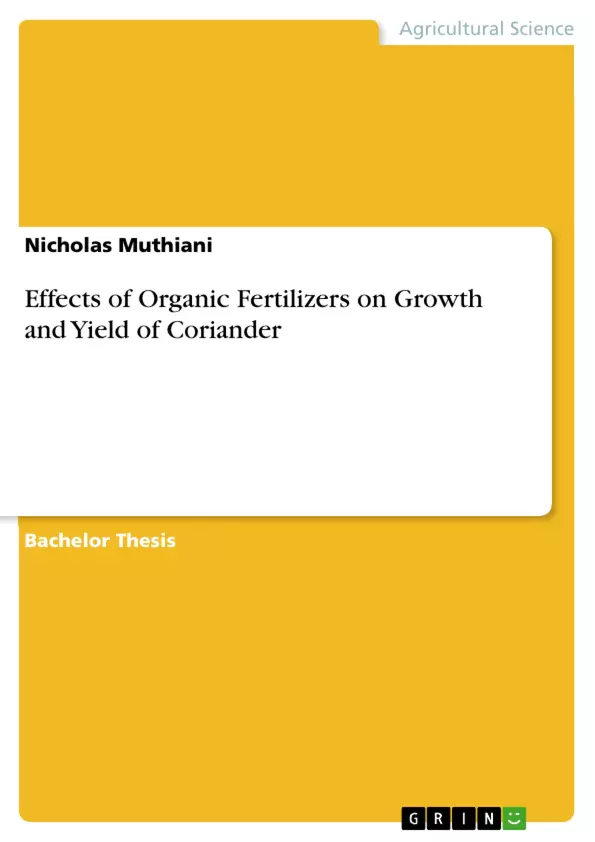Hypothesis: Cow dung manure has no effects on coriander development and final yield.
Coriander (Coriandrum sativum) is one of the most important spice and medicinal plants belonging to the family Apiaceae. It is also known as cilantro (American: cilantro). It can be grown on a variety of soil and prefers light, well drained, moist, loamy soil and can also grow on heavy black soil. It provides significant amount of Dietary fiber, Calcium, Selenium, Iron, Magnesium and Manganese per 100 gm. Generally, organic matter is added to soil to increase its fertility and to improve the physical structure for increased agricultural production. Previously, many investigators have reported beneficial uses of organic matter due to the presence of plant growth nutrients. Cattle manure is a source of nitrogen which is a vital nutrient for the activity of coriander growth. It is a fraction of many components such as amino acids, nucleic acids and chlorophyll. The use of cattle manure has been reported as a potential factor for vegetative growth. The experiment was conducted in Western Kenya, Bungoma County in Kibabii university farm.
Inhaltsverzeichnis (Table of Contents)
- DEDICATION
- ACKNOLEDGEMENTS
- ABSTRACT
- LIST OF TABLES
- INTRODUCTION
- PROBLEM STATEMENT AND JUSTIFICATION
- GENERAL OBJECTIVE
- SPECIFIC OBJECTIVE
- HYPOTHESIS
- LITERATURE REVIEW
- Coriander Production
- Coriander Varieties in Kenya
- Ecological requirements
- Scientific classification of coriander
- Organic manure
- Benefits of cattle manure
- Nutrient composition of cow manure
- Estimating manure application rates
- Manure application
- Nutritional deficiencies of coriander
- Nutritional composition of coriander
- Medicinal importance of coriander
- Coriander processing
- METHODOLOGY
- STUDY LOCATION
- FARM LAYOUT
- SOIL SAMPLING
- MATERIALS
- STUDY DESIGN
- DATA COLLECTION
- DATA ANALYSIS
Zielsetzung und Themenschwerpunkte (Objectives and Key Themes)
This research project investigates the effects of organic fertilizers, specifically cattle manure, on the growth and yield of coriander. The primary objective is to determine the optimal application rate of cattle manure for maximizing coriander production.
- Impact of organic fertilizers on coriander growth and yield
- Influence of cattle manure application rates on coriander development
- Optimizing coriander production through organic fertilization practices
- Potential of cattle manure as a sustainable and effective fertilizer for coriander cultivation
Zusammenfassung der Kapitel (Chapter Summaries)
The introduction provides a comprehensive overview of coriander, including its importance as a spice and medicinal plant, its cultivation practices, and its nutritional composition. It also highlights the significance of organic matter in soil fertility and the benefits of cattle manure as a source of nitrogen. Chapter 2 reviews the existing literature on coriander production, specifically focusing on the role of organic fertilizers, particularly cattle manure. This chapter explores the ecological requirements of coriander, its classification, the benefits of cattle manure, and its nutrient composition. Additionally, it delves into the challenges posed by nutrient deficiencies in coriander and its medicinal properties. Chapter 3 details the methodology used in the research, including the study location, farm layout, soil sampling techniques, materials used, study design, data collection methods, and data analysis procedures.
Schlüsselwörter (Keywords)
This research project focuses on the following key concepts: coriander production, organic fertilizers, cattle manure, growth, yield, nutrient composition, soil fertility, sustainable agriculture, and medicinal plants.
Frequently Asked Questions
What is the focus of this coriander research project?
The study investigates the effects of organic fertilizers, specifically cattle manure, on the growth and yield of coriander (Coriandrum sativum).
Why is cattle manure beneficial for coriander?
Cattle manure is a rich source of nitrogen, which is vital for the development of chlorophyll, amino acids, and nucleic acids, promoting robust vegetative growth.
Where was the experiment conducted?
The research took place at the Kibabii University farm in Bungoma County, Western Kenya.
What are the ecological requirements for growing coriander?
Coriander prefers light, well-drained, moist, loamy soil, but it can also adapt to heavy black soils.
What nutritional benefits does coriander provide?
Coriander is a significant source of dietary fiber, calcium, selenium, iron, magnesium, and manganese.
- Quote paper
- Nicholas Muthiani (Author), 2021, Effects of Organic Fertilizers on Growth and Yield of Coriander, Munich, GRIN Verlag, https://www.grin.com/document/1140827



